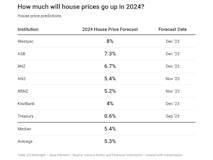House prices drop in December but the market shows signs of strengthening and do DTIs make sense for IPs?
Too long; didn't read? Here's this week's TLDRs...
Core Logic data shows signs of strengthening market
Read the article
REINZ December data show momentum, though house prices drop
Read the article
Suburbs to watch in 2024
Read the article
Kiwibank cuts home loan rates
Read the article
Tony Alexander: At some point the Reserve Bank will capitulate on interest rates
Read the article
Should buyers be worried in 2024?
Read the article
DTIs on investment properties don’t make sense
Read the article
Tenant who found neighbour hiding in his ceiling wins compensation
Read the article



